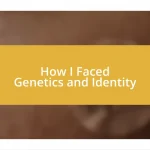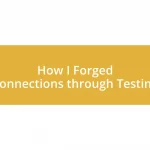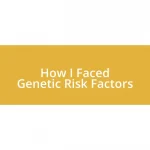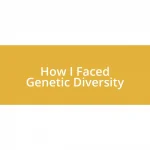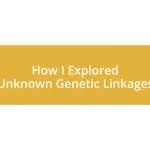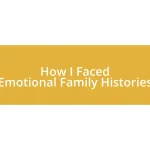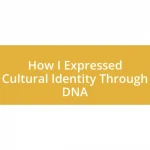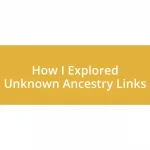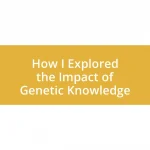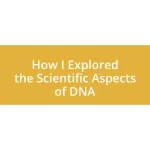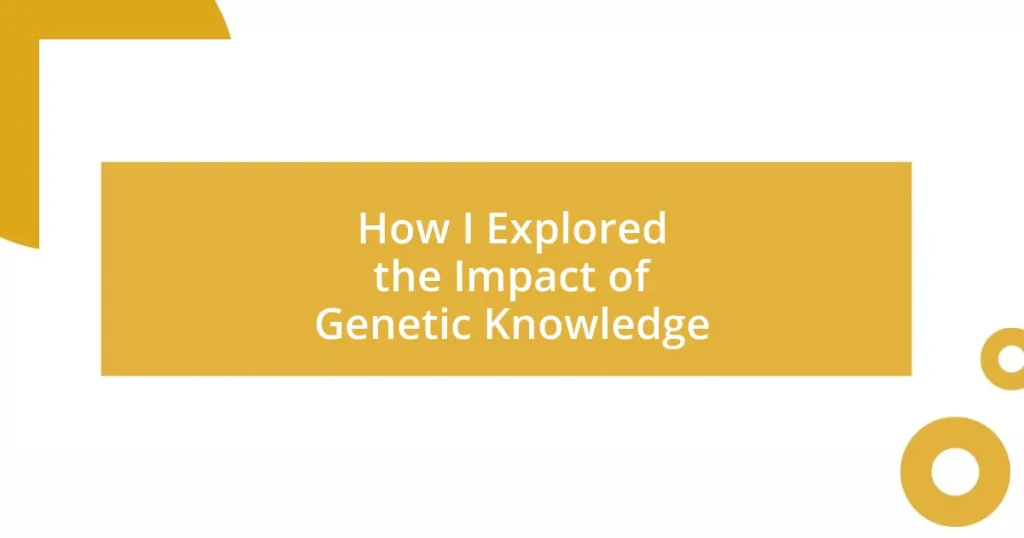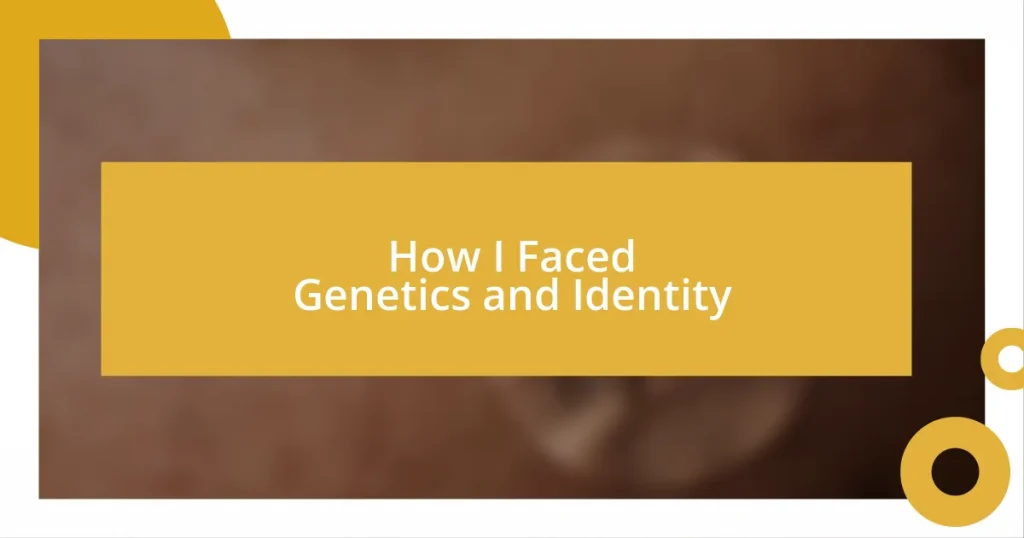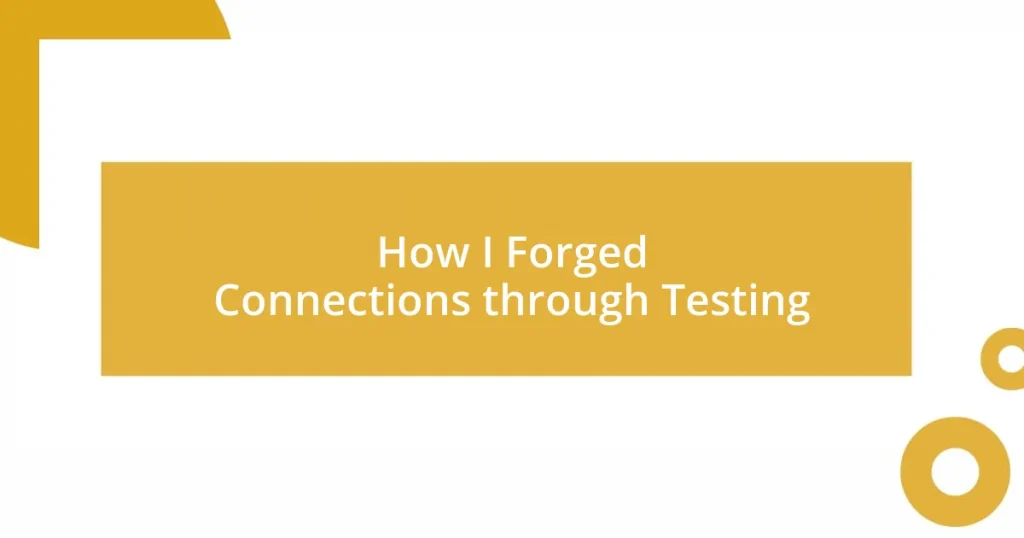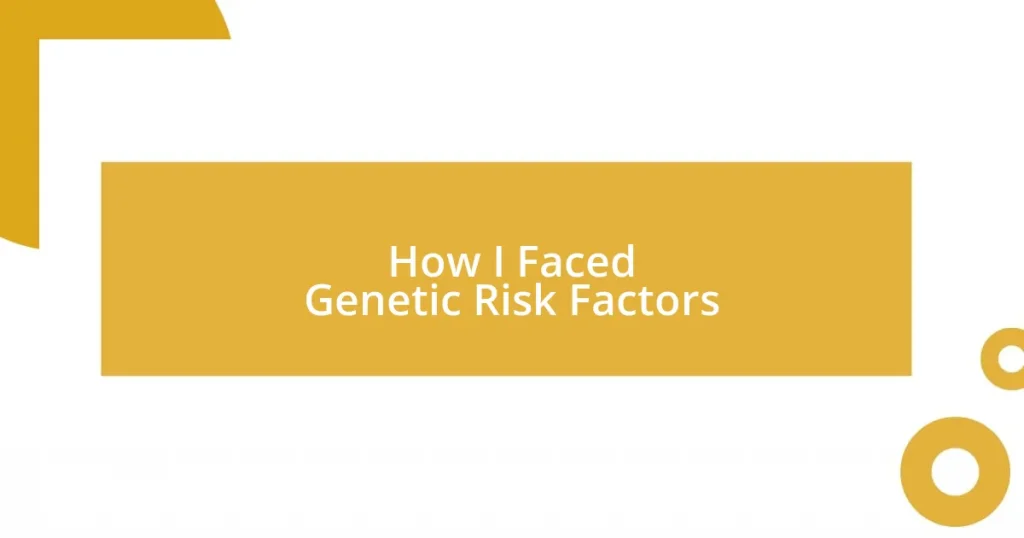Key takeaways:
- Genetic knowledge empowers individuals to make informed health decisions, fostering proactive lifestyle changes and family discussions about health risks.
- Various methods for exploring genetics, such as genetic testing and genome sequencing, provide valuable insights that can lead to improved health outcomes.
- Case studies illustrate how genetic information can shift fear into empowerment and provide critical diagnoses, enhancing the quality of life for individuals.
- Personal reflection on genetic knowledge offers deeper connections to ancestry, family history, and the ethical implications of genetic testing.
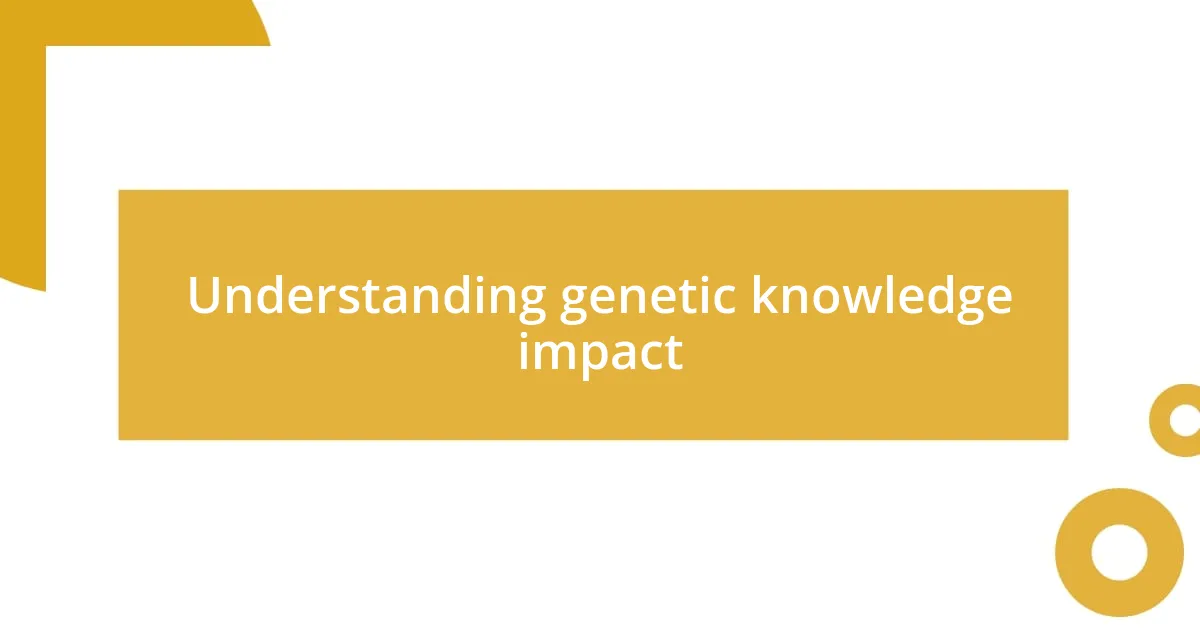
Understanding genetic knowledge impact
When I first delved into the realm of genetic knowledge, I was astounded by how much our DNA influences not only our physical traits but also our health risks and behaviors. I remember a friend sharing how a genetic test revealed a predisposition to a certain condition; it was a pivotal moment for both of us. It’s fascinating to think—how often do we underestimate the power of our genetic blueprint in shaping our lives?
As I explored this impact further, it struck me how genetic knowledge empowers people to take proactive measures for their health. For instance, a family member who learned about their genetic risks made significant lifestyle changes, which not only improved their well-being but also sparked conversations about health within our family. Does understanding our genetic makeup inspire us to live differently?
This journey into genetic knowledge also made me consider ethical implications. For example, if we know that a child might inherit a serious condition, should that knowledge guide our choices regarding parenthood? It raises deep questions about responsibility and the information we hold. Reflecting on my experiences, I see that understanding genetic impact isn’t just an academic concept—it’s a deeply personal exploration that resonates in our everyday decisions.
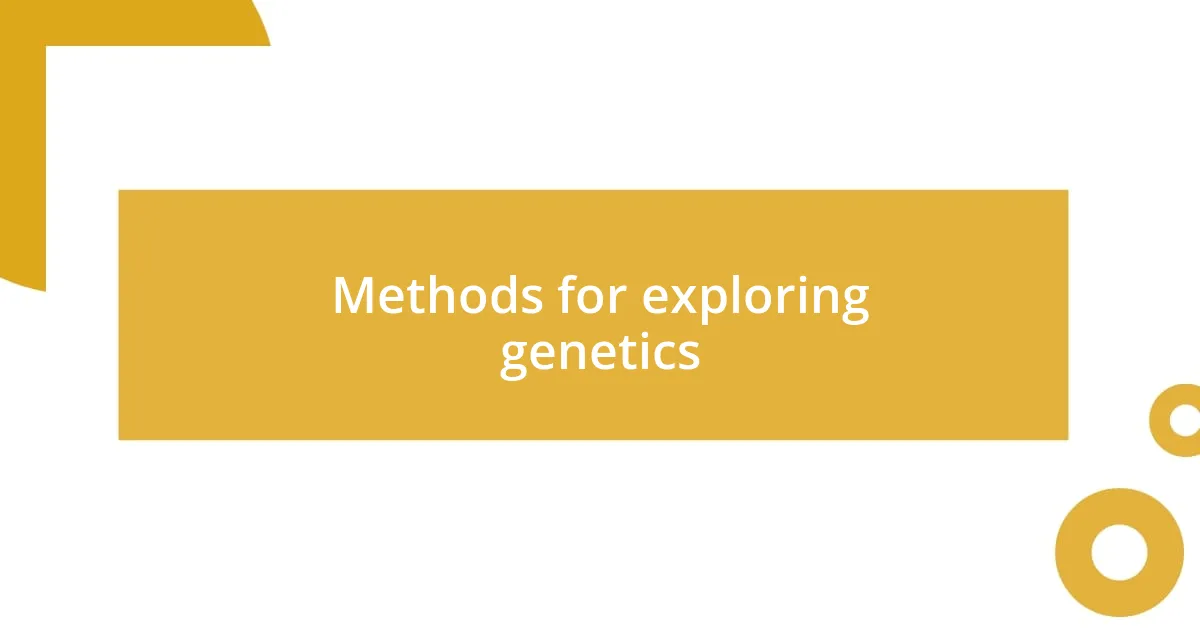
Methods for exploring genetics
When I embarked on my exploration of genetics, I quickly realized the diversity of methods available. Genetic testing, a powerful tool, allows individuals to analyze their DNA and uncover valuable information. This became particularly personal for me when I decided to undergo a genetic test myself. The anticipation of those results was intense; they felt like a door opening to understand myself on a deeper level.
Here are some common methods for exploring genetics:
- Genetic Testing: Provides insights into hereditary conditions and traits.
- Family History Analysis: Helps trace lineage and inherited traits through generations.
- Genome Sequencing: Offers a comprehensive mapping of an individual’s entire DNA, revealing detailed genetic information.
- Genealogical DNA Testing: Connects individuals to distant relatives and uncovers ancestral roots.
Each method not only satisfies curiosity but also holds the potential to inform meaningful life choices. I recall sitting down with my family to discuss our genetic findings, sparking a lively dialogue about health, similarities, and decisions we might need to make together. I found that these conversations not only educated us but also brought us closer as a family, united in our shared genetic journey.
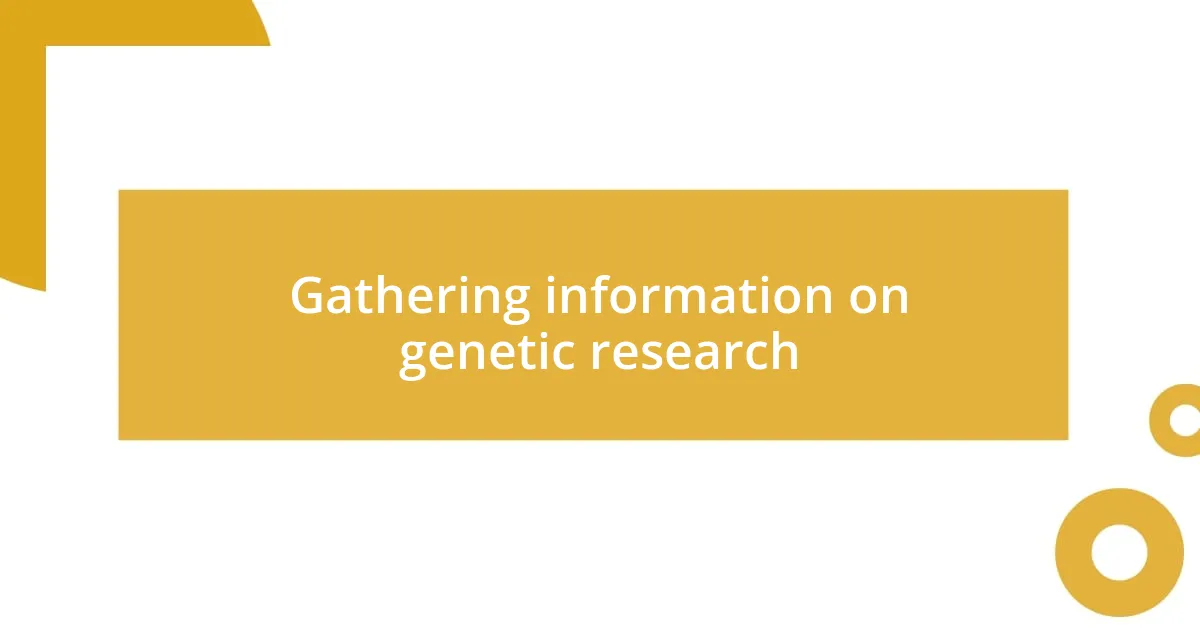
Gathering information on genetic research
Gathering information on genetic research truly opened my eyes to the vast body of knowledge out there. I spent countless hours sifting through scientific journals and online databases. Honestly, I was overwhelmed at first by the depth of research available. However, as I familiarized myself with key studies, I began to appreciate how interconnected genetics is with disease prevention and treatment protocols. It’s remarkable to think about how much we can learn simply by reading and absorbing the wealth of information others have contributed to this field.
One of the highlights of my information-gathering journey happened during a local genetics workshop I attended. The speakers were passionate researchers who shared their latest findings, making complex concepts accessible. Engaging with like-minded individuals during the Q&A session not only enhanced my understanding but also ignited a new passion for genetic advocacy. I found myself eagerly taking notes, realizing how each piece of information connected to the bigger health puzzle. Isn’t it incredible how gathering knowledge can lead to a deeper engagement with our health and well-being?
To systematically compare different approaches to understanding genetics, I created a table for easy reference. It helped me visualize the strengths and limitations of various research methods as I tailored my own exploration of genetic knowledge. This organization proved invaluable, allowing me to streamline my research and discover insights I could readily apply to my own experiences.
| Research Method | Strengths |
|---|---|
| Genetic Testing | Identifies specific genetic markers related to health |
| Family History Analysis | Reveals patterns of inheritance across generations |
| Genome Sequencing | Provides comprehensive insights into an individual’s DNA |
| Genealogical DNA Testing | Connects users with relatives, enhancing the understanding of ancestry |
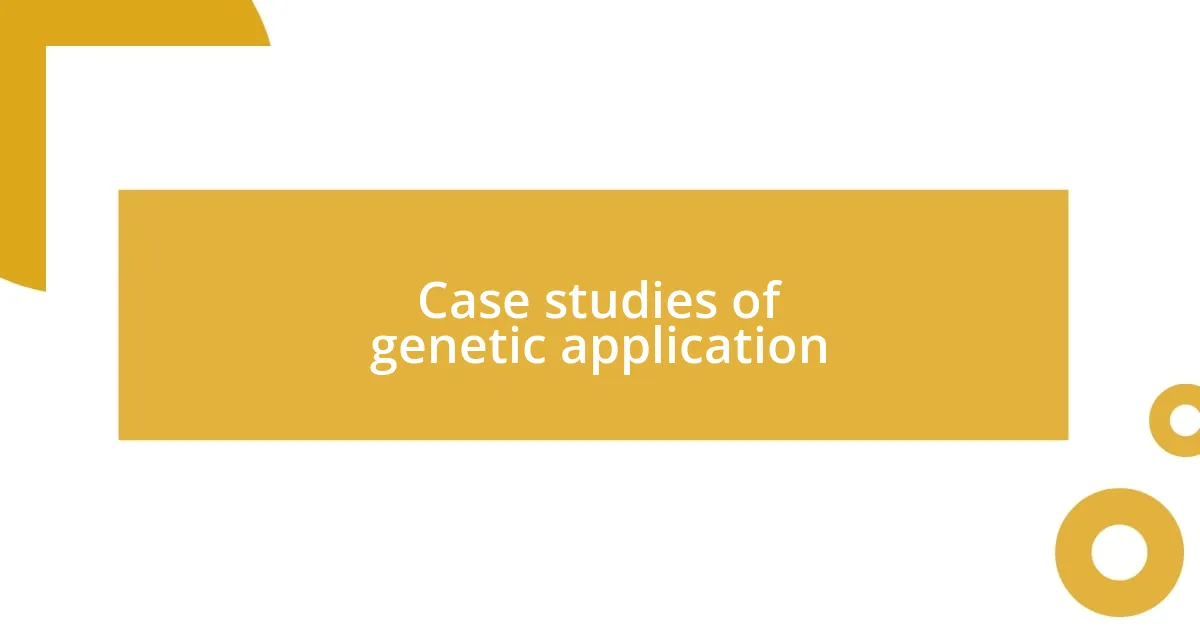
Case studies of genetic application
One particularly impactful case study I encountered involved a family with a history of breast cancer. After undergoing genetic testing, they discovered a BRCA1 mutation in one of the family members. This knowledge not only prepared them for proactive health decisions but also prompted meaningful discussions about preventive surgeries and routine screenings. It was a profound reminder of how genetic knowledge can transform fear into empowerment.
In another case study, I read about a young man who suffered from an undiagnosed illness for years. Through genome sequencing, doctors identified a rare genetic disorder that had previously eluded diagnosis. This revelation led to targeted treatment options and dramatically improved his quality of life. It struck me how sometimes, the right genetic insight can turn a frustrating search for answers into a path toward healing and hope. Isn’t it fascinating how our DNA can hold secrets that, once unveiled, can change lives?
Lastly, I came across a community health initiative that used genealogical DNA testing to help people of mixed heritage reconnect with their roots. Positive experiences shared by participants highlighted the emotional significance of understanding one’s lineage. Many spoke of a revived sense of identity and belonging as they delved into their ancestral pasts. This made me reflect on the power of genetics—it goes beyond health information; it can also weave together the threads of our personal histories and cultural connections.
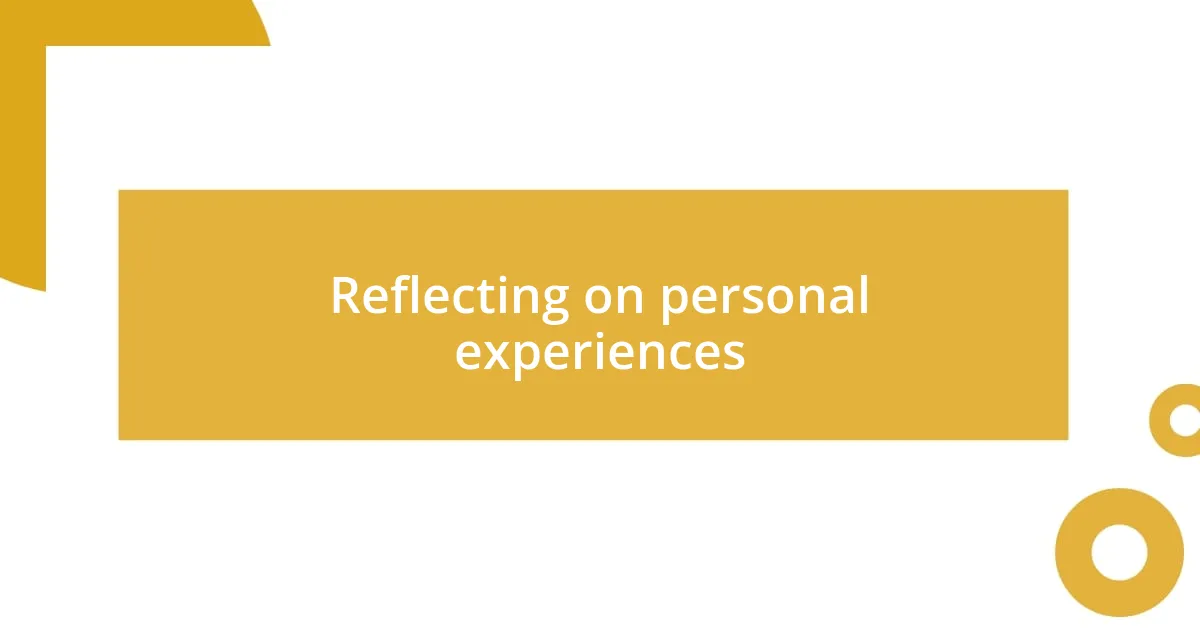
Reflecting on personal experiences
Reflecting on my personal journey through genetic knowledge has been both enlightening and transformative. I still remember the moment I learned about a genetic predisposition to a certain condition in my family. It felt like I was holding a double-edged sword—the information was daunting yet empowering. How many times do we overlook our family history, assuming it won’t affect us? For me, diving deep into genetic insights allowed me to confront my fears, rather than shy away from them.
I recall sharing my findings with close friends over coffee and how surreal that conversation became. They were genuinely intrigued, asking questions that sparked debates about ethics and the implications of genetic testing. Each discussion opened new avenues of thought that I had never considered, urging me to think critically about how our genetic make-up shapes our lives. I couldn’t help but ask myself: if we can unravel the complexity of our genes, how much of our destiny can we actually influence?
There was a poignant moment when I revisited my family tree, inspired by what I had learned. As I pieced together names and stories of my ancestors, I found myself overwhelmed with emotion. It was as if their struggles and triumphs were being reflected back at me, reminding me of the shared genetic ties we carry. This experience deepened my understanding of genetic knowledge as not just information but a bridge connecting us across generations, shaping identities and destinies in ways we often take for granted.
